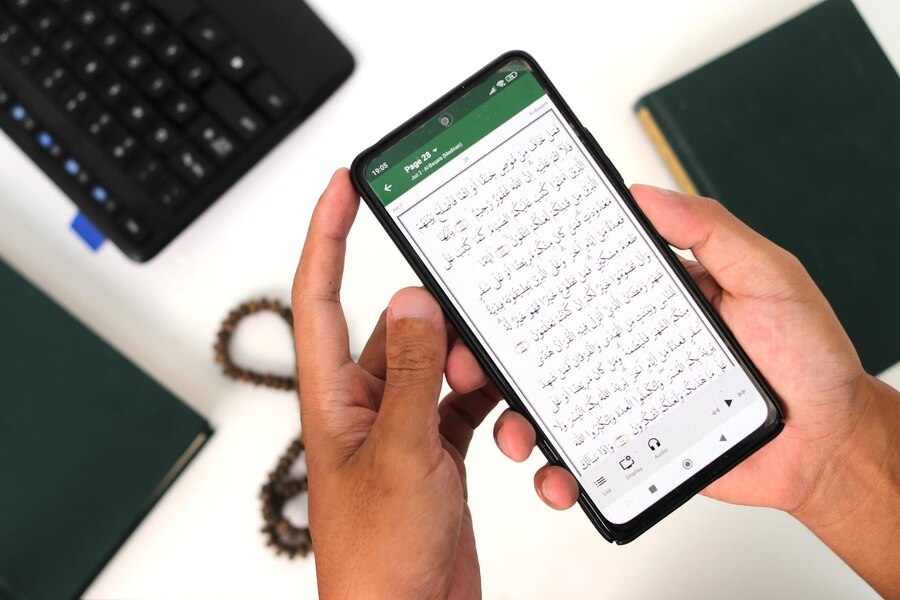Tajweed Perfecting Quranic Recitation A Guide for All Quran Readers
Reciting the Quran is not just about reading the words; it’s about pronouncing them with care and respect. This art of proper pronunciation is known as Tajweed. But what exactly is Tajweed? And why should it matter to every Quran reader, even if you’re not a scholar? In this guide, we’ll explore what Tajweed is, why it’s important, and how you can begin to improve your Quranic recitation with it.

Table of Contents
ToggleWhat is Tajweed?
Tajweed is an Arabic term that means “to make better” or “to improve.” When it comes to the Quran, Tajweed refers to the set of rules that govern how each letter and sound should be pronounced. These rules are there to ensure that the Quran is recited as it was revealed to the Prophet Muhammad (PBUH). Without Tajweed, it’s easy to mispronounce words, and this can sometimes change the meaning of the verses.
Think of Tajweed as a roadmap. Just as following the directions on a map gets you to your destination smoothly, applying Tajweed helps you recite the Quran with accuracy and respect.
The Importance of Tajweed
You might ask: why is Tajweed important? Well, the Quran is the word of Allah, and reciting it correctly is a way of showing reverence and respect. Incorrect pronunciation can lead to misunderstandings of the text’s meaning. Learning Tajweed helps ensure that you’re reading Allah’s words the way they were meant to be read.
Imagine trying to read a poem in a foreign language. Without knowing how to pronounce the words correctly, you wouldn’t capture its full beauty. The same applies to the Quran. Tajweed adds depth and clarity to your recitation.
The History of Tajweed
Tajweed has been practiced since the Quran was revealed over 1400 years ago. The early Muslims learned the correct way of reciting directly from the Prophet Muhammad (PBUH), who was taught by the angel Jibreel. Over time, scholars compiled these rules into a system, ensuring that the correct pronunciation would be preserved for future generations.
Basic Rules of Tajweed
Some basic Tajweed rules include knowing when to elongate a sound (known as madd), when to stop (known as waqf), and when to merge letters together (called idgham). There are also rules for nasalization (ghunnah) and how to properly articulate each letter.
For beginners, these rules can seem overwhelming. But once you start learning them, you’ll find that they are logical and designed to make recitation clearer and more beautiful.
Letters and Sounds in Tajweed
One of the main focuses of Tajweed is mastering the articulation of Arabic letters. Each letter in the Arabic alphabet has a unique point of articulation, or makhraj. By learning where and how each sound should come from—whether from the throat, tongue, or lips—you ensure accurate recitation.
Common Mistakes Without Tajweed
Without Tajweed, common mistakes include incorrect elongation of sounds, merging letters that should be separated, and improper pauses. These mistakes can lead to changing the meaning of words, which is why Tajweed is so essential. Imagine mispronouncing the word “peace” as “piece.” While it may seem like a small difference, it completely changes the message.
Benefits of Learning Tajweed
Learning Tajweed comes with many benefits, both spiritual and practical. For one, you develop a deeper connection with the Quran. When you recite with proper Tajweed, you’re more likely to feel the meanings of the verses resonate in your heart.
Additionally, learning Tajweed can enhance your focus during prayer (salah), as it demands concentration and mindfulness.
How to Start Learning Tajweed
If you’re new to Tajweed, don’t worry! Start with the basics: listen to reciters who are known for their mastery of Tajweed, and follow along. Taking lessons from a qualified teacher is highly recommended. There are also many online platforms where you can learn Tajweed at your own pace.
The Role of a Teacher in Tajweed
Having a teacher is one of the best ways to learn Tajweed. A good teacher can correct your mistakes and guide you through the rules. While books and online resources are helpful, nothing beats the personalized feedback of a teacher who can listen to your recitation and help you improve.
Tajweed and Quran Memorization (Hifz)
For those memorizing the Quran (Hifz), Tajweed is even more critical. Memorizing verses with the proper pronunciation from the start ensures that they will stay with you correctly for life. Tajweed also helps to retain the rhythm and flow of the verses, making memorization easier.
Tajweed Perfecting Quranic Recitation
Tajweed in Everyday Recitation
Tajweed isn’t just for scholars or those memorizing the Quran. It’s for everyone! Whether you’re reciting a few verses during your prayers or reading through a chapter in your spare time, applying Tajweed brings the words of the Quran to life. It allows you to recite with the beauty and accuracy the Quran deserves.
Tajweed and Children
Starting children on the path of Tajweed early can give them a strong foundation for life. Many Quran schools and madrassas focus on teaching children the basics of Tajweed so that they develop good recitation habits from the start.
Advanced Tajweed Techniques
Once you’ve mastered the basics, you can move on to more advanced Tajweed techniques, such as learning the seven different recitation styles (qira’at). This advanced study is typically for those who want to dive deeper into the science of Quranic recitation.
Online Resources to Learn Tajweed
With modern technology, learning Tajweed has never been easier. Many websites, YouTube channels, and apps are dedicated to teaching Tajweed. You can find tutorials, practice sessions, and even live classes. This makes it accessible for anyone, no matter where you live.
Summary: Why Tajweed Matters
Tajweed is more than just a set of rules—it’s a way to connect deeply with the Quran. Whether you’re a beginner or an experienced reciter, learning and applying Tajweed can transform your recitation from simply reading words to engaging with the divine message in its most authentic form.
FAQs – Tajweed Perfecting Quranic Recitation
1. What is the meaning of Tajweed in the Quran?
Tajweed refers to the rules and guidelines for correct pronunciation of Arabic letters and words in Quranic recitation.
2. Do I need a teacher to learn Tajweed?
While you can start learning online or through books, a teacher can provide essential feedback and correct mistakes that you might not notice on your own.
3. Can children learn Tajweed?
Yes, children can learn Tajweed, and starting early can help them develop strong Quranic recitation habits.
4. How long does it take to learn Tajweed?
The time it takes depends on the learner’s dedication and frequency of practice. With regular lessons, you can start mastering the basics within a few months.
5. Why is Tajweed necessary for Quran recitation?
Tajweed ensures that the Quran is recited as it was revealed, maintaining its meaning and beauty. It also prevents mistakes that could alter the meaning of the text.
Half Week Free Trial Classes
Upon completion of your course, you will receive a complimentary certificate. What are you waiting for, then?
Enroll in our class now for a free trial.
Read More: Learn Quran Kids & Adults Online – Convenient and Effective



